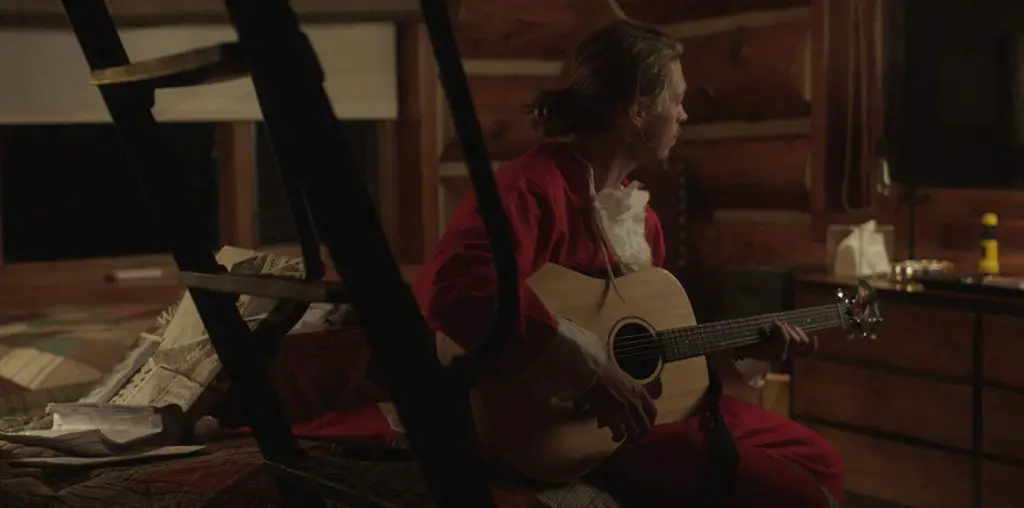
Meet Woody Grant (Bruce Dern), a disheveled, wispy-haired wreck of a man. He wears rumpled flannel shirts. Half-shaven facial hair clings like moss to his wrinkled face. Woody’s mind and body have become rusty from the residue of alcoholism and the onset of dementia. From behind wire-framed glasses, he stares vacantly at… something, somewhere. A 75 year-old retired auto mechanic, Woody has long since gone to seed. He responds to questions with a delayed, “Eh?” He sports a nasty gash on his forehead, sustained from a recent fall. Woody’s unsteady legs and stiffened joints suggest that more tumbles await, as his body continues to betray him.
One day, a psychic light-switch flicks on within Woody’s pickled, elderly brain. A sweepstakes letter arrives in the mail, proclaiming him the winner of one million dollars. Suddenly, the curmudgeonly codger lurches into life. He turns determinedly defiant, vowing to venture from his Billings, Montana homestead to Lincoln, Nebraska, where he’ll collect the fortune he believes he’s won. His younger son David (Will Forte), a home electronics salesman still smarting from a recent break-up, rightfully smells a scam. Perhaps sensing an opportunity to connect with his emotionally unavailable dad, David reluctantly agrees to drive Woody to Lincoln and claim the prize money.
“Nebraska” is Alexander Payne’s film about both the cruelty and wisdom of old age. Depressing? Not really. There’s also humor and hope to be found amidst the stark reality of Woody’s situation. Payne films in black and white, as if to strip away artifice from this very intimate road story, to focus completely on his characters. One could argue that there’s not a lot going on in “Nebraska,” as father and son pursue a goal that’s almost certainly unattainable. But so luscious and vivid are the film’s people and landscapes, that Payne’s movie becomes magnetically compelling. Ordinary human faces are made extraordinary. Barren flatlands are transformed into a poetic heartland heaven.
Meanwhile, with the finite observation of a surgeon, “Nebraska” probes the very delicate, complex relationship between a son yearning for connection and a father whose interpersonal circuitry has long since burned out. Is there a real person hiding within this indifferent husk of a man? When David laments his recent break-up with a long-time squeeze, Woody doesn’t recall that his son even had a girlfriend. Later, as David asks Woody about the Big Questions that only a middle-aged son would broach with an elderly father, his dad responds with a cruel indifference.
Did you love Mom? “It never came up.”
Are you sorry you married her? “All the time.”
Why did you have kids? “I liked to screw, and your Mother’s a Catholic.”
There’s both an incredulous hilarity and a genuine sadness generated from these intimate exchanges, and we ache for David as he pushes in vain to feel his father’s elusive emotional pulse.
Along the way to Lincoln, David and Woody stop in Hawthorne, Nebraska, the family’s one-time hometown. Rumors of his pending status as a millionaire run rampant, prompting past acquaintances and distant relatives to circle Woody like vultures, waiting to pounce on a piece of his future fortune. Meanwhile, by talking about Woody with other, less predatory townsfolk, David assembles a vicarious sense of what prompted his father’s emotional inaccessibility. In one scene, David connects with one of his father’s old flames, a sweet newspaper editor played by the radiant Angela McEwan. Her lovely heart and open recollections provide David with a candid insight into his father’s surprisingly dynamic life.
“Nebraska” flashes images that might, in the hands of a lesser filmmaker, be used for either comic relief or eliminated altogether. Road signs advertising a First United Methodist Church or Rotary Club usher us into dying towns where dilapidated reader boards hang from empty store windows in seemingly post-apocalyptic ruin. Payne finds desolate beauty in gentle montages of barns, cattle fields, street signs, and churches. He forces us to slow down and savor the surreal sight of skeletal trees bursting from the earth, like hands reaching for the heavens.
“Nebraska” acts as a companion piece to “About Schmidt,” Payne’s earlier film about a similar introvert struggling to inject passion into an empty life. Visiting Woody’s family, a collection of passive zombies seemingly plucked from George Romero’s “Night of the Living Dead,” we’re enlightened to the joyless environment that helped shape his dull demeanor. We observe the absurd silliness of stone-faced old men staring at a televised football game in mute, communal silence. Woody’s only lifeline beyond this corpse-like collection of kinsfolk is his crass, feisty wife (June Squib), whose venomous spunk and fighting spirit lift him out of this petrified limbo.
In the role of a lifetime, Bruce Dern pulls off that masterful magic trick that few thespian sorcerers can ever hope to achieve. He turns an impenetrable, unremarkable character into a sympathetic, compelling man. And during the film’s final, transformative stretch, Woody reveals to David the noble motives behind his bullheaded pursuit of the sweepstakes winnings. And David, enlightened by Woody’s awkward expressions of love, comes to embrace his father’s stubborn nature, however nerve-wracking it might be.
Staring across a vast field of farmland that he once owned, Woody exclaims, “It’s a bunch of old wood and some weeds.” His comments might as well describe the passive, sedentary friends and family he revisits during the film’s cross-country trek. But as “Nebraska” comes to an end, we sense that Woody is not ready to join these dying souls and go gentle into that good night. As he comes to accept the surprising results of his determined mission, it’s clear that embers still smolder inside his stony veneer, struggling to escape and burst into glorious flame.
